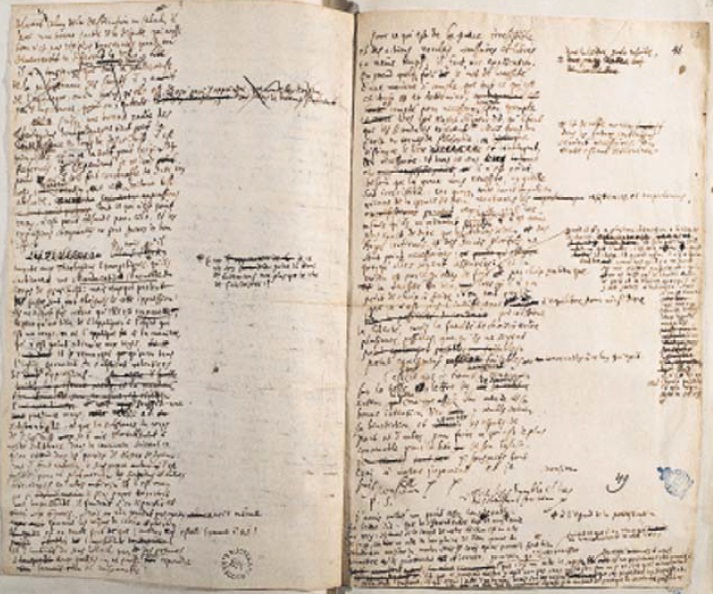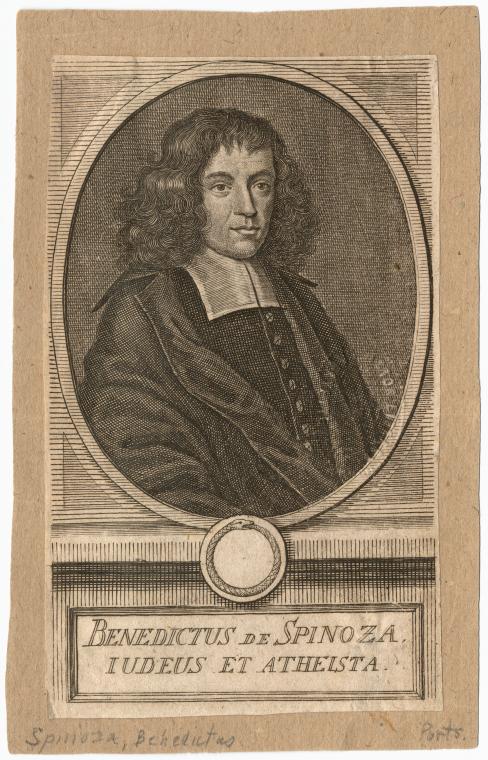Gabriel Wagner on:
[Wikipedia]
[Google]
[Amazon]
Gabriel Wagner (c. 1660 – c. 1717) was a radical German philosopher and materialist who wrote under the nom-de-plume Realis de Vienna. A follower of Spinoza and acquaintance of Leibniz, Wagner did not believe that the universe or bible were divine creations, and sought to extricate philosophy and science from the influence of
 Wagner believed that both education and philosophy should be modernized and focus on mathematics, physics and medicine, but not theology. In this regard he held that Germany had made more progress, while French, Italian and Spanish thinkers were overly influenced by followers of
Wagner believed that both education and philosophy should be modernized and focus on mathematics, physics and medicine, but not theology. In this regard he held that Germany had made more progress, while French, Italian and Spanish thinkers were overly influenced by followers of
 Wagner is known for his longstanding correspondence with Leibniz, and his erudition and innovative understanding of philosophy and natural sciences during his time, according to historian Cornelio Fabro.Fabro, 1968, p.598
Historian Jonathan Israel writes that Wagner is an important materialist philosopher of the late 17th and early 18th centuries, and an example of both radical philosophy and atheism produced by the growing university system of the period.Israel, 2006, p.43Israel, 2006, pp.167-8 Historian Frederick Beiser writes that Wagner and his fellow materialists in Germany, though they were less numerous than those found in France and England, developed mechanistic explanations for human behavior and raised fears of spreading religious skepticism.Beiser, 2000, p.21
Wagner is known for his longstanding correspondence with Leibniz, and his erudition and innovative understanding of philosophy and natural sciences during his time, according to historian Cornelio Fabro.Fabro, 1968, p.598
Historian Jonathan Israel writes that Wagner is an important materialist philosopher of the late 17th and early 18th centuries, and an example of both radical philosophy and atheism produced by the growing university system of the period.Israel, 2006, p.43Israel, 2006, pp.167-8 Historian Frederick Beiser writes that Wagner and his fellow materialists in Germany, though they were less numerous than those found in France and England, developed mechanistic explanations for human behavior and raised fears of spreading religious skepticism.Beiser, 2000, p.21
theology
Theology is the study of religious belief from a Religion, religious perspective, with a focus on the nature of divinity. It is taught as an Discipline (academia), academic discipline, typically in universities and seminaries. It occupies itse ...
. Wagner also held radical political views critical of the nobility
Nobility is a social class found in many societies that have an aristocracy. It is normally appointed by and ranked immediately below royalty. Nobility has often been an estate of the realm with many exclusive functions and characteristics. T ...
and monarchy
A monarchy is a form of government in which a person, the monarch, reigns as head of state for the rest of their life, or until abdication. The extent of the authority of the monarch may vary from restricted and largely symbolic (constitutio ...
. After failing to establish lasting careers in cities throughout German-speaking Europe, Wagner died in or shortly after 1717.
Life
Wagner studied under scholar Christian Thomasius inLeipzig
Leipzig (, ; ; Upper Saxon: ; ) is the most populous city in the States of Germany, German state of Saxony. The city has a population of 628,718 inhabitants as of 2023. It is the List of cities in Germany by population, eighth-largest city in Ge ...
, and in 1691 published a philosophical tract critical of Thomasius, "Discourse and doubts in Christ: a Thomasian introduction to courtly philosophy."Dascal, 2008, pp.490-1Israel, 2006, pp.173-5. The tract satirically dubbed Thomasius the "German Socrates
Socrates (; ; – 399 BC) was a Ancient Greek philosophy, Greek philosopher from Classical Athens, Athens who is credited as the founder of Western philosophy and as among the first moral philosophers of the Ethics, ethical tradition ...
" and attracted attention within philosophical circles, including from Leibniz, who sought to contact Wagner. In the same year, after a dispute over rent, Wagner was expelled from university and imprisoned. Following his release, Wagner traveled in 1693 to Halle, where as a result of his increasingly libertine views he wholly broke with Thomasius, who by contrast was becoming more conservative. Moving to Berlin
Berlin ( ; ) is the Capital of Germany, capital and largest city of Germany, by both area and List of cities in Germany by population, population. With 3.7 million inhabitants, it has the List of cities in the European Union by population withi ...
later in 1693 and then to Vienna
Vienna ( ; ; ) is the capital city, capital, List of largest cities in Austria, most populous city, and one of Federal states of Austria, nine federal states of Austria. It is Austria's primate city, with just over two million inhabitants. ...
, Wagner was in 1696 given a temporary position in Hamburg
Hamburg (, ; ), officially the Free and Hanseatic City of Hamburg,. is the List of cities in Germany by population, second-largest city in Germany after Berlin and List of cities in the European Union by population within city limits, 7th-lar ...
, which he lost due to his novel and sometimes polemical philosophical positions.
Receiving support from Leibniz, Wagner worked for a time at the Herzog August Library in Wolfenbüttel; and maintained his contact with Leibniz.Poser, 2004, pp.290-291 Leibniz wrote to Wagner in 1696, describing his admiration for Aristotle
Aristotle (; 384–322 BC) was an Ancient Greek philosophy, Ancient Greek philosopher and polymath. His writings cover a broad range of subjects spanning the natural sciences, philosophy, linguistics, economics, politics, psychology, a ...
and opposing contemporary attacks on him, despite his view that Aristotle had discovered only a small portion of the discipline.Cassirer, 1943, pp.383-4
Opposing his former mentor Thomasius' belief in the soul, Wagner published another text in 1707, "Critique of Thomasian views on the nature of the soul." Theologian Johann Joachim Lange accused Wagner of Spinozist sympathies in 1710, and Wagner replied to these criticisms in the same year.
The last record of Wagner is found in Göttingen
Göttingen (, ; ; ) is a college town, university city in Lower Saxony, central Germany, the Capital (political), capital of Göttingen (district), the eponymous district. The River Leine runs through it. According to the 2022 German census, t ...
in 1717, where he came into conflict with historian of philosophy Christoph August Heumann. Wagner presumably died shortly thereafter.
Philosophy
 Wagner believed that both education and philosophy should be modernized and focus on mathematics, physics and medicine, but not theology. In this regard he held that Germany had made more progress, while French, Italian and Spanish thinkers were overly influenced by followers of
Wagner believed that both education and philosophy should be modernized and focus on mathematics, physics and medicine, but not theology. In this regard he held that Germany had made more progress, while French, Italian and Spanish thinkers were overly influenced by followers of Aristotle
Aristotle (; 384–322 BC) was an Ancient Greek philosophy, Ancient Greek philosopher and polymath. His writings cover a broad range of subjects spanning the natural sciences, philosophy, linguistics, economics, politics, psychology, a ...
, Galen
Aelius Galenus or Claudius Galenus (; September 129 – AD), often Anglicization, anglicized as Galen () or Galen of Pergamon, was a Ancient Rome, Roman and Greeks, Greek physician, surgeon, and Philosophy, philosopher. Considered to be one o ...
and Ptolemy
Claudius Ptolemy (; , ; ; – 160s/170s AD) was a Greco-Roman mathematician, astronomer, astrologer, geographer, and music theorist who wrote about a dozen scientific treatises, three of which were important to later Byzantine science, Byzant ...
. Believing in intellectual freedom, Wagner was an admirer of German philosopher and professor Nicolaus Hieronymus Gundling, who favored "atheistic" classical Greek philosophy.
As articulated in his 1707 critique of Thomasius, Wagner did not believe in a soul, in divine providence, in the divinity of the bible, or in divine creation. He instead advocated reason, the most "godly" aspect of humankind, as a means of eradicating superstition. Wagner therefore celebrated advances in science facilitated by Descartes and even considered himself a Cartesian, though he disagreed with the latter's Christian metaphysical
Metaphysics is the branch of philosophy that examines the basic structure of reality. It is traditionally seen as the study of mind-independent features of the world, but some theorists view it as an inquiry into the conceptual framework of h ...
beliefs and even sought to undermine them.Israel, 2007, p.15Erdmann, 1890, p.38 Deeply influenced by Spinoza, Wagner placed even greater emphasis on the importance of experimentation and empiricism in developing knowledge.
Wagner held radical political beliefs, advocating a restructuring of society according to more egalitarian principles and advocating greater emphasis on administration, education and culture.Israel, 2006, pp.335-7 Reform of educational institutions was a particular concern of his writing.Israel, 2007, pp.6-7 Wagner contested that aristocracy by birth was inferior to intellectual achievement. He also believed that Germany's fragmentary political system resulted in a weak and mismanaged government. In these beliefs Wagner was influenced by but disagreed with political thinkers such as Hugo Grotius, Thomas Hobbes
Thomas Hobbes ( ; 5 April 1588 – 4 December 1679) was an English philosopher, best known for his 1651 book ''Leviathan (Hobbes book), Leviathan'', in which he expounds an influential formulation of social contract theory. He is considered t ...
and Niccolò Machiavelli
Niccolò di Bernardo dei Machiavelli (3 May 1469 – 21 June 1527) was a Florentine diplomat, author, philosopher, and historian who lived during the Italian Renaissance. He is best known for his political treatise '' The Prince'' (), writte ...
. Much of Wagner's political and philosophical system was oriented, ultimately, towards securing religious, intellectual, and personal freedom, a project of the Enlightenment as a whole.
Legacy
 Wagner is known for his longstanding correspondence with Leibniz, and his erudition and innovative understanding of philosophy and natural sciences during his time, according to historian Cornelio Fabro.Fabro, 1968, p.598
Historian Jonathan Israel writes that Wagner is an important materialist philosopher of the late 17th and early 18th centuries, and an example of both radical philosophy and atheism produced by the growing university system of the period.Israel, 2006, p.43Israel, 2006, pp.167-8 Historian Frederick Beiser writes that Wagner and his fellow materialists in Germany, though they were less numerous than those found in France and England, developed mechanistic explanations for human behavior and raised fears of spreading religious skepticism.Beiser, 2000, p.21
Wagner is known for his longstanding correspondence with Leibniz, and his erudition and innovative understanding of philosophy and natural sciences during his time, according to historian Cornelio Fabro.Fabro, 1968, p.598
Historian Jonathan Israel writes that Wagner is an important materialist philosopher of the late 17th and early 18th centuries, and an example of both radical philosophy and atheism produced by the growing university system of the period.Israel, 2006, p.43Israel, 2006, pp.167-8 Historian Frederick Beiser writes that Wagner and his fellow materialists in Germany, though they were less numerous than those found in France and England, developed mechanistic explanations for human behavior and raised fears of spreading religious skepticism.Beiser, 2000, p.21
See also
* Baruch Spinoza * Christian Thomasius * Matthias Knutzen * Nicolaus Hieronymus Gundling *René Descartes
René Descartes ( , ; ; 31 March 1596 – 11 February 1650) was a French philosopher, scientist, and mathematician, widely considered a seminal figure in the emergence of modern philosophy and Modern science, science. Mathematics was paramou ...
*Gottfried Wilhelm Leibniz
Gottfried Wilhelm Leibniz (or Leibnitz; – 14 November 1716) was a German polymath active as a mathematician, philosopher, scientist and diplomat who is credited, alongside Sir Isaac Newton, with the creation of calculus in addition to ...
* Jonathan Israel
* Eclecticism
Notes
Sources
* * * * * * * * * {{DEFAULTSORT:Wagner, Gabriel 1660 births 1717 deaths Enlightenment philosophers People from the Electorate of Saxony Leipzig University alumni Materialists Rationalists German metaphysicians 17th-century German philosophers 18th-century German philosophers German philosophers of religion German male writers